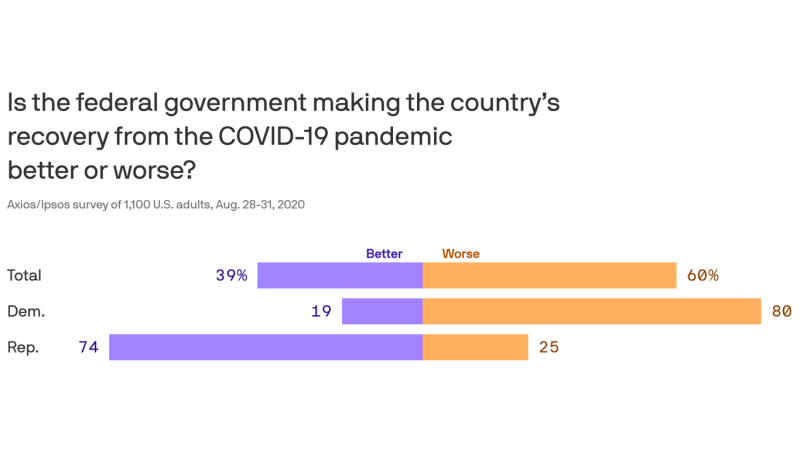Axios-Ipsos poll: A harsh verdict for government's coronavirus response



Sam Baker
Most Americans think the federal government is making the coronavirus pandemic worse, according to the latest installment of the Axios-Ipsos Coronavirus Index.
Why it matters: This is a pretty searing indictment of the federal response — not only that it has not helped, but that it's part of the problem.
Between the lines: There's a stark partisan divide here.
- 74% of Republicans say the federal government is making things better, while 80% Democrats say the federal government is making things worse.
- Most independents (68%) also say the government is making things worse.
Overall trust in the federal government hasn't changed much over the past few weeks, but it's far below the levels we measured in the spring.
- When the Axios-Ipsos index launched in late March, more than half of Americans said they trusted the federal government to look out for their best interests. This week, it's at just 32%, and has been stuck in the low 30s for months.
- Americans continue to trust Joe Biden more than Donald Trump to give them accurate information about the virus, though neither breaks 50%.
Yes, but: Despite that lack of faith in the federal government, most Americans are optimistic that this will all be in better shape relatively soon.
- 57% said they're somewhat or very hopeful that the U.S. will get the pandemic under control within the next six months, while 43% were not too hopeful or not hopeful at all.
- More educated respondents — those with at least some college — were somewhat less hopeful about a quick turnaround, as were Black and Hispanic respondents.
- But partisanship was, yet again, the main dividing line: 82% of Republicans and 42% of Democrats were hopeful that things would be under control in six months.
Reality check: It's almost impossible to predict where the U.S. will be in February.
- There's a chance that at least some people might be receiving a vaccine by then, though that's by no means a sure thing and it's not realistic to expect widespread vaccination anywhere near that early.
- On the other hand, flu season and cold weather pushing people back indoors both threaten to make the pandemic worse.
- We've not managed to control the pandemic in the six months we've been doing this so far, and it's notable that Black and Hispanic people — who have borne the brunt of that failure — are less optimistic than white respondents about the next six months.
METHODOLOGY: This survey was conducted Aug. 28-31, among a nationally representative sample of 1,100 adults. It has a margin of error of +/- 3.3 percentage points.


If Donald Trump was the president he would have prevented all this from happening.
How could he have done that? Democrats provide the funding, and comprise at least half of the Federal government, and they haven't been very helpful in finding solutions
Trump Failed US BIG TIME
So which "expert" are we to believe